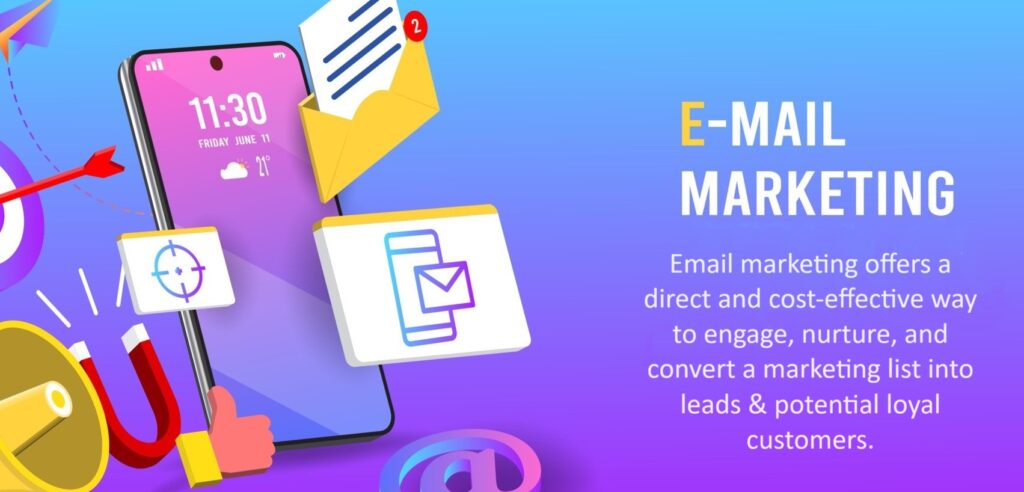Advantages to
Email Marketing
Advantages to Email Marketing
Benefits of Email Marketing : A Closer Look

Email marketing offers numerous benefits that make it a valuable tool for businesses across various industries.
Here are some key advantages:
– Direct Communication: Email marketing enables direct communication with your audience. Provide a personal touch and increase the likelihood of engagement.
– Cost-Effectiveness: Email marketing is incredibly cost-effective. It requires minimal investment for potentially high returns, making it suitable for businesses of all sizes.
– Targeted and Segmented Outreach: Segmentation allows for precise targeting based on demographics, behaviours, or preferences increasing relevance, engagement, and conversion rates.
– Drive Conversions and Sales: Email campaigns are effective for nurturing leads and guiding them through the sales funnel. Well-crafted content, personalised offers, and strategic CTAs prompt action and drive sales.
– Measurable Results and Insights: Email marketing platforms provide robust analytics. Metrics such as open rates, click-through rates, and conversions offer valuable insights, enabling data-driven decisions for campaign optimisation.
– Build Customer Relationships: Consistent communication fosters relationships with customers. Providing value through informative content, exclusive offers, and updates strengthens brand loyalty and turns customers into advocates.
– Enhanced Brand Awareness: Regular communication keeps your brand at the forefront of recipients’ minds. Valuable and engaging content reinforces brand identity and increases brand awareness.
– Integration and Complementarity: Email marketing integrates seamlessly with other marketing channels. It complements social media, content marketing, and other strategies, enhancing their effectiveness.
– Adaptability and Automation: Marketing automation tools enable efficient scheduling and personalisation of emails.
– Compliance and Control: With proper opt-in processes and compliance measures, businesses maintain control over their communication while adhering to regulatory requirements, ensuring ethical and legal practices.

What Do I need to start Email Marketing?
Starting email marketing requires understanding your audience, creating engaging content, and adhering to best practices and regulations.
By following these steps, you can begin building and executing successful email marketing campaigns to reach and engage your audience effectively.
1) Email List: Identify a targeted marketing list. You may already have one, otherwise you can purchase or build one.
If you require the purchase of a marketing list contact us. Connect Marketing offer targeted marketing lists tailored to meet your specific business needs.
2) Email Marketing Platform: Choose a reliable email marketing platform or software that suits your needs. There are various options available, such as HubSpot, Brevo & Marketo. These offer features like email campaign creation, automation, analytics, and list management.
3) Segmentation Strategy: Plan how you’ll segment your email list based on demographics, firmographics, behaviours, interests, or purchase history. Segmentation allows you to send targeted and personalised content, improving engagement and conversions.
4) Compelling Content: Develop engaging and valuable content for your email campaigns. Craft attention-grabbing subject lines, informative and relevant content, compelling CTAs (call-to-actions), and visually appealing designs to encourage action from recipients.
5) Consistent Schedule: Establish a consistent email sending schedule that aligns with your audience’s preferences. Whether it’s weekly newsletters, promotional emails, or event reminders, maintain a regular cadence to keep your brand top-of-mind.
6) Compliance with Regulations: Ensure compliance with email marketing regulations such as GDPR (General Data Protection Regulation) or PECR. Obtain consent from subscribers, provide clear opt-out options, and adhere to privacy and data protection laws.
7) Tracking and Analytics: Utilise the analytics provided by your email marketing platform to track key metrics like open rates, click-through rates, conversions, and more. Analysing these metrics helps in measuring campaign effectiveness and optimising future strategies.
8) Optimisation and Testing: Continuously optimise your email campaigns by testing different elements such as subject lines, content formats, CTAs, and send times. A/B testing allows you to identify what works best for your audience.
9) Automation Tools: Consider using automation tools to streamline repetitive tasks like welcome emails, drip campaigns, or abandoned cart reminders. Automation saves time and ensures timely and personalised communication.
10) Quality Control and Review: Before sending out emails, perform quality checks to ensure accuracy, proper formatting, and mobile responsiveness. Review content for spelling errors and broken links to maintain professionalism.
Want to find out more about Email Marketing?
For an in-depth understanding of how email marketing can elevate your business, contact us today.
Our expert team is ready to provide personalised insights and guidance tailored to your specific needs, ensuring you harness the full potential of email marketing to achieve remarkable results.
Contact Us

